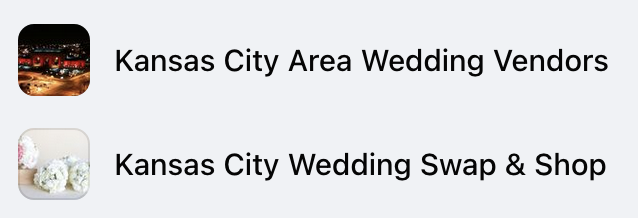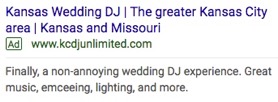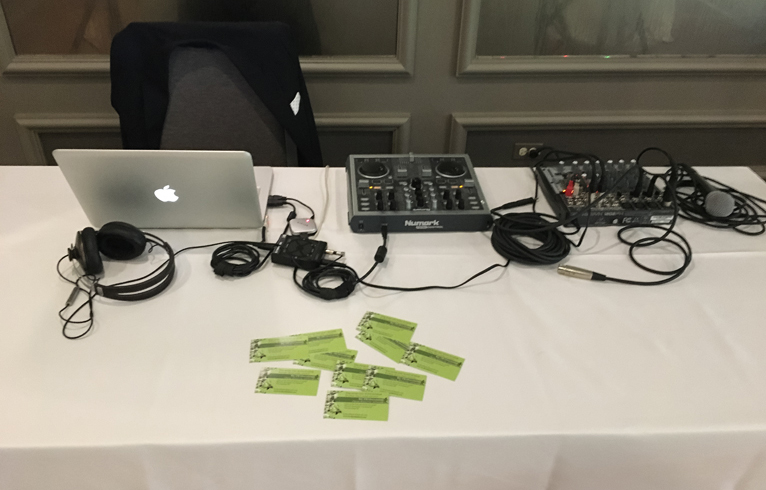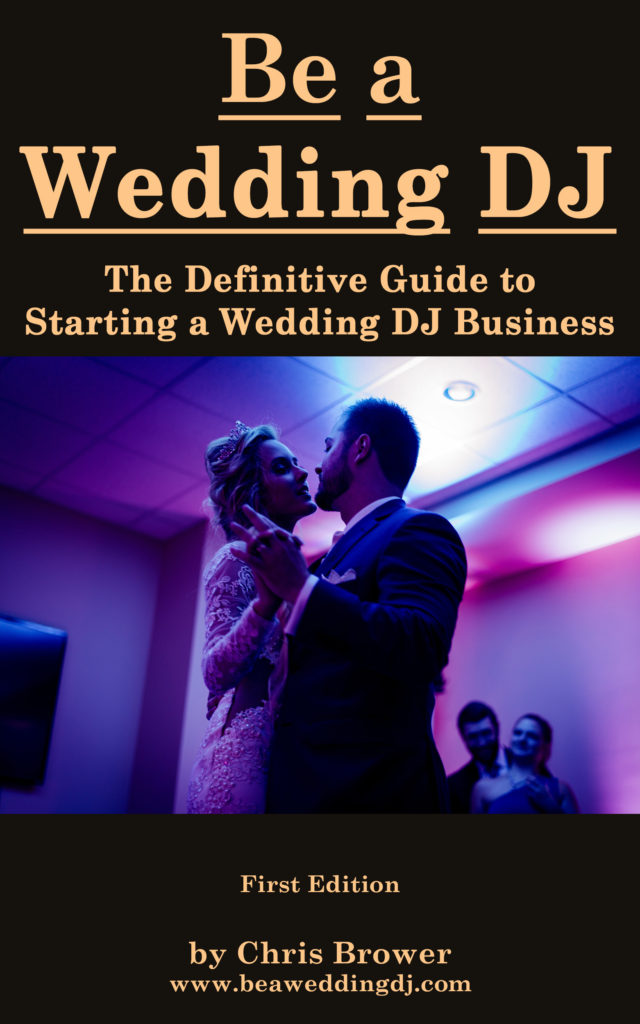How to Promote a Wedding DJ Business
by Chris Brower
Last Updated: November 24, 2021
Wedding DJ gigs likely won’t just come your way. Rather, you’ll need to actively promote your wedding DJ business.
Some promotional methods cost money, while some can be done for free.
It’ll likely take a lot of trial and error before you see what works and what doesn’t. Some might get you tons of DJ bookings, while others won’t.
So let’s look at some ways to promote your wedding DJ business.
Word of Mouth
The cheapest (it’s free!) and perhaps easiest way to promote a wedding DJ business is telling people about it. When people ask you what you do for a living or what are your hobbies, you could mention you’re a wedding DJ. When someone tells you they or someone they know just got engaged, you could share that you’re a wedding DJ.
There’s a good chance you can get some business from this. I’ve DJed for several friends or coworkers who had previously heard I was a DJ, so when the time came for them needing to hire a DJ, they knew who to ask – me!
Word of mouth is great, but it can only go so far. You might get a few jobs from this but probably not many. That’s why you’ll need some additional things too.
Website
First, you need a website for your wedding DJ business. Luckily these days you don’t need to hire an expensive website designer to create you a website; you can do it yourself with various platforms, such as Squarespace, WordPress, Weebly, and others.
I won’t go in-depth on the nuts and bolts of actually creating a website—there are plenty of great resources online for that—but let’s discuss some tips for a good DJ website. (For many of these, yes, you’ll need to have DJed a few weddings before you’ll have the necessary materials. Do the best you can until you have more experience.)
What Every Wedding DJ Website Needs
- A sales pitch of some kind, as in, something attention-getting about why couples should hire you. Examples include:
- “Over 100 events of experience”
- “Dozens of five-star reviews”
- “Award-winning”
- “Offering lighting packages unlike any other DJ”
- “The easiest vendor you’ll work with”
- “For couples who want AWESOME rather than CHEESY”
- What areas you serve – Cities, towns, etc. You don’t have to list every single one but give a general idea (“The greater Baltimore area”), etc.
- Photos or videos from weddings you’ve DJed – Make the photos less about you (though it’s a good idea to have at least one photo of you) and more about how packed dance floors are when you DJ. Pick photos of people having a blast—and people of all ages and backgrounds, if possible.
- Bio – Tell a little bit about yourself, but keep it focused on music/entertainment/performing experience/anything that helps you stand out. And if you’re married, certainly you can share that too (after all, you’re now in the business of providing music for brand new marriages).
- Rates and what you offer – Clearly state what your prices are, though it’s essential to include that prices may have to be adjusted due to certain circumstances, such as travel distance. Also, it’s important to explicitly say what services you offer (and be more specific than “DJing and emceeing”). Can you provide music for ceremonies? What’s included in a reception package (how many hours? Cocktail hour too? Dance floor lights*?)? Do you offer any other specific things, such as uplighting, projectors, live music (as in, you can perform a live song on guitar and vocals, etc.)?
- Reviews – Have at least a few glowing reviews on your website. If you’ve yet to DJ a wedding, there are some ways you can still have reviews, such as having friends, mentors, or coworkers write a review based on your general skills (“Antoine has always been reliable and dedicated to making people happy.”). Don’t have anyone lie and claim you DJed for them and that you’re an amazing DJ when they actually haven’t used your DJ services before. Keep the comments more about your reliability, people skills, knowledge of music, etc.
- Contact information – Make it easy by creating a contact form. A lot of website-creation platforms have a simple form you can add. Make sure you ask for their name, email address (or phone number or both), the date and location of their event, and a space for writing whatever message they want to add. And what’s also extremely important: how they heard about you. That way you’ll learn what is driving business your way.
Study other DJs’ websites and see what you like and what you don’t. This website is your main tool to build confidence in people who might know nothing about you. Most people aren’t going to spend tons of time on a DJ website. They want to get a general sense and see if they want to reach out to you or not. Make your website give them what they want, quickly and clearly.
Make sure you read our article, How to Create an Amazing Wedding DJ Sales Pitch. A great sales pitch is huge to promoting your wedding DJ business and getting bookings.
What Makes a Wedding DJ Website Bad
- Typos – Proofread your website! It’s shocking how many websites I come across with blatant typos. On the one hand, I know a DJ’s spelling and grammar abilities don’t necessarily relate to their actual DJing abilities, but typos signify sloppiness, carelessness, and a general lack of professionalism (oh boy, I hope I don’t have any typos on this website…). If you’re not a good speller, get a friend/family member/professional to look it over. (It’s always a good idea to ask friends to look over your website in general and give feedback about what’s good vs. what’s not.)
- Confusing layout – Some DJ websites cram so much into a page, with columns, boxes, side menus, etc., that your eyes kind of freak out and don’t know where to look. Make it easy. People should read left to right and then down the page like a book.
- Too much information – You want to be thorough and clear, but you don’t have to tell them everything, like technical specs about the equipment you own, your thoughts on what makes a wedding good or bad, your personal tastes in music (unless it’s relevant), your day job (again, unless it’s relevant), etc. You want a sales pitch, but you don’t need 50 examples of how “out of this world DJ Fun Times Entertainment is!” to the point it’s nauseating.
- Photos are too much about the DJ – You should include a photo of you. One. Maybe two. But no more. Some DJs try really hard to be such badasses that the photos on their website mostly emphasize them and their cool outfits. As well, you don’t really need to show your equipment, unless you’re showing what kind of dance floor lights and other visuals you have, which is good to do. But in general, focus your photos more on full dance floors and happy couples.
- Don’t list their rates – You’ll be surprised how often you see this, but it happens all the time: DJs who don’t list their rates and instead require you to contact them to get a quote. On the one hand, I get this—and I used to be guilty of it!—as each wedding might have its own price, because of distance, hours, and other factors, but you should give some idea of your pricing. Make sure to include that prices may need to be adjusted because of these factors. Most people will understand that.
A bad wedding DJ website may be one of the reasons why you’re not booking wedding DJ jobs.
Ready for the complete guide to becoming a wedding DJ? Here you go.

Social Media
Like any business, wedding DJ companies benefit from social media. It’s another way to get your name out there, and couples are definitely searching social media for more information about the vendors they hire. While there are several social media platforms, I’ll just focus on the current top three and why I think you should or shouldn’t be on those. Certainly, experiment and see if any others can help you as well.
It’s essential you create a Facebook page that contains a lot of the similar items as your website—photos, information, and website and contact information. If you’re DJing a wedding, by all means you can post about it! If you’re now offering uplights or some other new service, you can post about that.
Invite your friends, families, and potential clients to Like and Follow you on Facebook. That said, the reality is that a lot of people aren’t going to feel much compulsion to follow a wedding DJ—but of course if you post awesome content, they might be up for it.
Local Wedding Vendor Pages
Consider searching for local wedding vendors pages, where brides and grooms post, looking for vendors. You’ll see posts like, “I need a DJ for my wedding on May 1st, 2023 – any recommendations?”

You can then reply with information/a sales pitch for your business, plus link to your wedding DJ Facebook page.
This can be a free way to book some gigs, but I’ve found these posts from couples get TONS of replies and fast. Not unusual to see 100+ replies within a few hours. So you have to really be checking regularly and reply quickly to have a shot. It’s also likely you could get beaten by a DJ who bids incredibly low, much lower than you should be charging. But it’s worth a shot to see if it gets you great results.
What also makes Facebook a good platform is people can leave reviews of you on there. Reviews are essential! People visiting your page organically or from one of your posts on a wedding vendor group want to see reviews right then and there.
You Can Leave Reviews Too!
You obviously won’t review the couples you work with, but you can review other vendors you’ve worked with, as well as the venue. However, only leave 100% positive reviews (if that’s truly how you feel). Don’t leave negative reviews for other vendors or venues, unless you want to be iced out by the local community. Keep those thoughts to yourself. But if you’ve worked with an awesome photographer, by all means leave them a nice review:
“I DJed a wedding that Karen was the photographer for in April. She was so easy to work with and sent me some amazing photos a month later. I can only assume she’s great to work with for clients too. I hope to work a wedding with her again!”
The vendor will be grateful and then likely leave you a review too. They’re also probably then more likely to refer potential clients your way. I’ve gotten a lot of gigs, because a photographer (or other vendor) was talking to a couple and said, “Have you found a DJ yet? I recommend Chris. Here’s his information.” And of course you can possibly do the same for them.
Honestly, it’s your call if Twitter is a good platform for your wedding DJ business.
For most DJ companies, I don’t think it’s going to drive much business.
Twitter’s main emphasis is on text (though you can post photos too). Short, pithy comments from a wedding DJ aren’t likely to generation much interest on Twitter, particularly from potential clients.
Personally, I don’t use Twitter for my DJ company, but if you’d like to try, go for it.
I love Instagram but held out for years for my DJ business. I thought, while having photos and videos on your website and Facebook are important, couples aren’t likely to visit a DJ’s Instagram and click the “Follow” button. However, I soon learned that followers aren’t so much what you’re after. The benefits of Instagram are:
- You can regularly post photos and videos from your weddings, either when you’re at the wedding or later. It’d be too cluttered if your DJ website had dozens and dozens of photos and videos, but it works totally fine if your Instagram does. It’s more and more proof how many jobs you’ve done and how many people have had a great time when you DJed.
- You’re probably not a professional photographer or videographer. Instagram kind of gives you free rein for your photo/video quality to be just okay. This is an easy, cheap way to take photos and videos, and if they’re not the slickest ever, it’s okay.
- While potential clients might not follow you, vendors will. This was the huge eye-opener when I finally joined. It’s good old-fashioned networking. They want attention, so they’ll follow you, and you in turn should follow them back. Engage with each other, liking posts and leaving comments, and they’ll become more aware of you, and are then more likely to recommend your services in the future to potential clients.
- Tag the venue in the photos, as well as any other vendors. Especially give credit and tag the photographer if they sent you that photo. Take advantage of these numerous ways for people to find your page.
Where to Advertise Online
Having a good website and social media presence aren’t enough. Plus, as good of a wedding DJ as you are, you can’t expect word-of-mouth to get all your jobs for you; people just don’t chit-chat about wedding DJs as much as we’d all like. You’ll have to actively advertise your wedding DJ business.
The Knot and WeddingWire
The two big hitters in the game are the Knot and WeddingWire, wedding websites where vendors create profiles and potential clients find them.
When you Google things like “Chicago wedding DJ” or other similar searches, the Knot and WeddingWire routinely show up at the top of the list. Thus, couples routinely use them to find all their vendors. So that’s why you have to be on at least one of them, or you’re going to struggle to get business. It’s as simple as that.
The Knot and WeddingWire are pretty similar: as a vendor you create a profile that includes a bio/sales pitch, photos and videos, a place for people to leave reviews about you, and contact/website information. Luckily you can easily look through other DJs’ profiles and see what you like/what you don’t, as you create your own.
Advertising on these can often be free . . . but your profile will be positioned as far down in the search list as possible, and thus, it’s basically worthless. You also might get fewer privileges, such as how many photos you can upload and other things.
You simply have to buy a membership to get a real shot at getting attention and inquiries. The higher the package (aka, the more expensive), the more likely you are to appear near the top of the results in the Knot or WeddingWire. And sadly, if you don’t buy the top or at least second-highest level, you’re just going to get lost in the dozens and dozens (and possibly hundreds) of competitors in your city.
Trust me, it’s expensive ($200-$400 a month for a higher listing), but it makes all the difference in actually getting inquiries, and thankfully you’ll soon enough be charging $800, $1,000, or more for weddings, so you’ll make your money back.
Check with a salesperson to see if you can start at a lower package and then upgrade to a higher one later if you feel you’re not yet ready to go all-in, as these websites often require you to sign a one-year contract. You can often upgrade at any time, but they won’t let you downgrade until your current contract ends.
Personally, I’ve gotten the vast majority of my business through the Knot and not very much from WeddingWire, so I think the Knot is worth the money and WeddingWire might not be, but you could be different.
It’s going to take some experimenting to see what creates results and what doesn’t. That’s why it’s important to ask anyone who contacts you how they heard about you, so you can further understand what’s working and what’s not.
What About Google Ads?
I invested a lot of money and effort in creating Google ads (little ads that appear in Google search results—example below), but it never got me that much business, so I stopped doing it. Certainly, you can try and see if you have better luck.

Remember, a lot of people have ad blockers installed in their browser, so they won’t see those ads anyway.
Do what you can with search engine optimization (SEO) to make your website appear higher in the Google search results. But it’s simply going to be very, very hard for your website to appear on page one, particularly when you’re new. SEO is a long, complicated subject, so I won’t cover it here. Still, it’s worth getting a basic understanding so you can increase the likelihood your website appears higher in search results.
Business Cards
On the one hand, business cards seem a little old-fashioned, but it’s still a good, simple way to get your name out there, particularly when people aren’t at a computer.
At any events you DJ, put out a few business cards on your table in an obvious spot, so if anyone approaches your table (often to make a request), they can see them and grab one.

There are likely plenty of companies in your city that can print business cards for you, or you can try online companies like Vistaprint. It’s possible to get 500 business cards for very cheap, and you’re unlikely to run out (at least for a very long time).
Make sure they clearly state your wedding DJ business name, any slogan or very short sales pitch you can include (“Over 200 events of experience!”), your website address, email address, and phone number.
Exchange business cards with any vendor you work with. Follow them on social media, send them a “nice working with you!” email. Also leave a few (say, 10 business cards) with the venue’s event coordinator/someone working at the venue in a leadership/managerial capacity, so they can give them to future couples that book them. This is all old-fashioned networking. It works.
Also get in the habit of putting a few in your wallet or purse.
It’s going to happen—you’ll be out at a party, something non-wedding related, just having fun, and you’ll start making chit-chat with someone, and you’ll casually mention you’re a wedding DJ, and they’ll perk up, because someone in their family or friend circle just got engaged and might be looking for a DJ.
Much better to have a business card on hand, just in case, rather than scribbling out your info on a scrap of paper and hoping that doesn’t get lost. (Obviously, a business card can get lost, so if you can get any contact information for this person right then and there, that’s good too.)
Bridal Fairs
Bridal fairs are events where vendors set up booths in a convention center and potential clients walk through, potentially stopping at your table to get more information.
One of the big producers of bridal fairs is American Consumer Shows.
I recommend having some more experience under your belt before doing a bridal fair. They can be intense and kind of draining—a lot of noise and tons of people walking around, plus numerous other DJs there—but it can be a way to meet a lot of potential clients.
Type up an info sheet that you can hand to clients that includes review snippets (“Chaz was an incredible DJ!”), website/social media/contact information, your prices, and anything else that helps sell you quickly. You simply won’t have a lot of time to have long chats with these prospective clients at this event, so you want to give them something they can take home and look over on their own time.
I also recommend creating a sign-up sheet, where these prospective clients can write their name and contact information, as well as the date of their event, so you can follow-up later.
For bridal fairs, you’ll want some pizazz, so you’ll want to think about visuals. Get a banner or two made with your logo, any slogans, sales pitches, etc. You also might need to bring or rent a table. Put a tablecloth over it. Make a photo slideshow on your laptop of people dancing at your events and have it running when guests stop by. Consider giving away candy or something else fun. I did a bridal fair and gave out glow sticks, which I thought would be fun, until I was (very obviously) reminded that we were in a large, brightly-lit room, thus the glow sticks, which only look cool in the dark, were basically worthless.
Bridal fairs can be expensive (over $1,000), stressful, and a lot of work. It’s not a bad idea to attend one and get a sense of it before deciding to sign up for one yourself.
Another good idea is to partner with another DJ, and attend a bridal fair that they’re doing. Offer to help (free of charge) talking to people for their wedding DJ business (not yours). But, if a couple stops by and asks for a date that this DJ is booked—if the DJ approves of this, of course—share that you’re available. This is how I booked a job or two my first year by attending a bridal fair my mentor was doing, and if a date came up for which he was already booked, he’d turn things over to me.
Other
There are other websites like yellowpages.com, Yelp, and others, where DJs can advertise, but I haven’t heard of DJs having much success with them. I tried Instagram ads, and nothing came of them.
You’re also going to get contacted by wedding magazines and publications that want you to pay to advertise your wedding DJ business in their publication. I’ve never done this, as it seems unlikely it’d generate much business these days.
If couples aren’t getting recommendations from friends/family/coworkers/other vendors, they’re searching online. Invest the money in a high-tier of advertising on the Knot or WeddingWire. If you can sign up for free on other platforms, go for it. And experiment. See what works and what doesn’t. But remember that for many of these you’re required to sign a year-long contract, so keep that in mind before agreeing to plunk down hundreds of dollars a month.
Related Articles:
- How Much Money Can Wedding DJs Make?
- How to Start a Wedding DJ Business (Quick Guide)
- How to Get Tons of Five-Star Reviews
- 8 Ways to Book More Wedding DJ Gigs
- How to Reduce Costs For Your Wedding DJ Business
- How to Create an Amazing Wedding DJ Sales Pitch
- Why You're Not Booking Wedding DJ Jobs
*If you click the product links and make a purchase, we earn a commission. This helps pay for this website and other expenses. This is at no additional cost to you.
